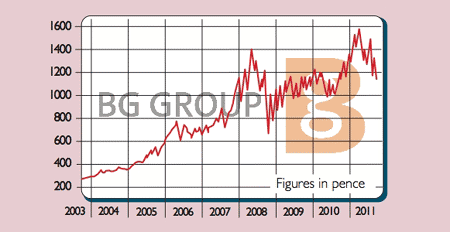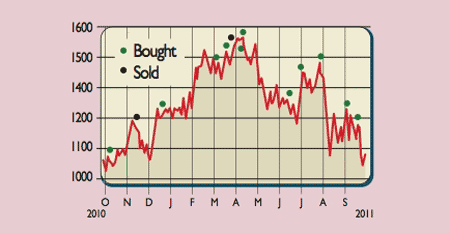Should you buy shares in BG Group?
Integrated energy company BG Group saw revenues increase by 26% in the second half of 2011. And with demand for gas growing in places such as China, the outlook looks good. So should you buy BG Group shares now? Phil Oakley investigates.
Get the latest financial news, insights and expert analysis from our award-winning MoneyWeek team, to help you understand what really matters when it comes to your finances.
You are now subscribed
Your newsletter sign-up was successful
Want to add more newsletters?

Twice daily
MoneyWeek
Get the latest financial news, insights and expert analysis from our award-winning MoneyWeek team, to help you understand what really matters when it comes to your finances.

Four times a week
Look After My Bills
Sign up to our free money-saving newsletter, filled with the latest news and expert advice to help you find the best tips and deals for managing your bills. Start saving today!
What is BG Group?
BG Group is an integrated energy company with three main divisions. Exploration and production (E&P) has total reserves of 16.2 billion barrels of oil, which equates to 69 years of production at 2010 levels. Current production comes mostly from established areas such as Egypt, Britain, Kazakhstan and Trinidad and Tobago. However, E&P also has big reserves in Brazil, Australia and America that provide the platform for future growth. Its liquefied natural gas (LNG) division sells gas to high-value markets, having turned it into liquid. The transmission and distribution division owns gas distribution firms in Brazil and India. It also has ownership stakes in five power stations in Europe and the Philippines.
What is the company's history?
Since it was demerged from British Gas plc in 1997 the firm has become one of the world's leading gas companies, with impressive growth rates in production and profits. The late 1990s saw BG expand via a stake in the giant Karachaganak gas field in Kazakhstan. It also bought distribution and LNG capabilities.
The early 2000s saw it spin off Transco, its British transmission and distribution business, while it continued to develop its E&P assets and grew strongly. The latter half of the decade saw a transformation of the group's growth prospects with a series of huge oil discoveries in Brazil's Santos Basin, the acquisition of gas assets in Australia and its entry into the US shale gas market.
MoneyWeek
Subscribe to MoneyWeek today and get your first six magazine issues absolutely FREE

Sign up to Money Morning
Don't miss the latest investment and personal finances news, market analysis, plus money-saving tips with our free twice-daily newsletter
Don't miss the latest investment and personal finances news, market analysis, plus money-saving tips with our free twice-daily newsletter
Who runs BG Group?
Sir Frank Chapman has been CEO since 2000. He joined in 1996 as MD of E&P after spells at Royal Dutch Shell and BP. His total pay was £2.9m in 2010. Ex-Rio Tinto CEO Sir Robert Wilson is chairman. Fabio Barbosa is chief financial officer.
How is trading?
Second-quarter results to the end of June 2011 saw revenues increase by 26% to $5.1bn and operating profit rise by 43% to $2.15bn. Earnings per share increased by 27% to 33 US cents. The interim dividend rose 10% to 11 cents per share. E&P was the strongest performer, with operating profits up 90% to $1.42bn due to higher gas prices, production growth and lower costs. LNG profits were down 2% at $553m, while transmission and distribution profits fell by 9% to $167m.
What's the outlook for BG Group?
Good. Economic growth in emerging markets and fuel substitution from oil and coal should drive gas demand particularly in places such as China, where gas is a very low proportion of the energy mix. BG's growth assets in Brazil, Australia and America should allow it to increase production by 7% a year during the next decade.
The analysts
Of the 36 analysts surveyed by Bloomberg, 32 say "buy" and four "hold". There are no "sells". The average price target is 1,712p 50% up on the current price. Most bullish is Unicredit Research with a 1,880p price target. AlphaValue is most bearish with a 1,491p target. Our view: BG is a quality company in a growth market, but it is not obviously cheap at current levels. One for the watch list, to buy on weakness.
The numbers

Stockmarket code: BG
Share price 1,144p
Market cap: £39.4bn
Net assets (June 2011) $28.2bn
Net debt (June 2011) $9.5bn
P/E (current year estimate) 14.6x
Yield (prospective) 1.3%
Directors' dealings

Most dealing activity has been linked with the vesting of company share plans. Frank Chapman and Martin Houston both sold shares earlier this month to meet tax liabilities linked to these plans. Executive directors are expected to hold 200% of their base salary in shares, with members of the executive committee expected to hold 100% of their base salary. Current holdings are shown below.
Director and shares held
F Chapman: 2,077,669
M Houston: 847,849
J Berget: 170,020
A Almanza: 198,349
R Wilson: 104,000
R Booker: 43,311
Get the latest financial news, insights and expert analysis from our award-winning MoneyWeek team, to help you understand what really matters when it comes to your finances.
Phil spent 13 years as an investment analyst for both stockbroking and fund management companies.
-
 Should you buy an active ETF?
Should you buy an active ETF?ETFs are often mischaracterised as passive products, but they can be a convenient way to add active management to your portfolio
-
 Power up your pension before 5 April – easy ways to save before the tax year end
Power up your pension before 5 April – easy ways to save before the tax year endWith the end of the tax year looming, pension savers currently have a window to review and maximise what’s going into their retirement funds – we look at how